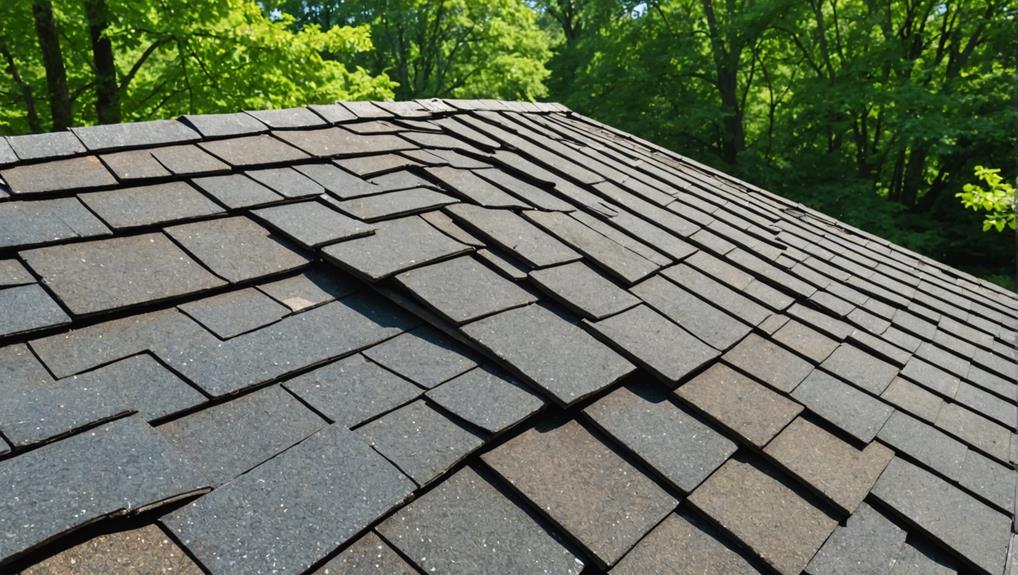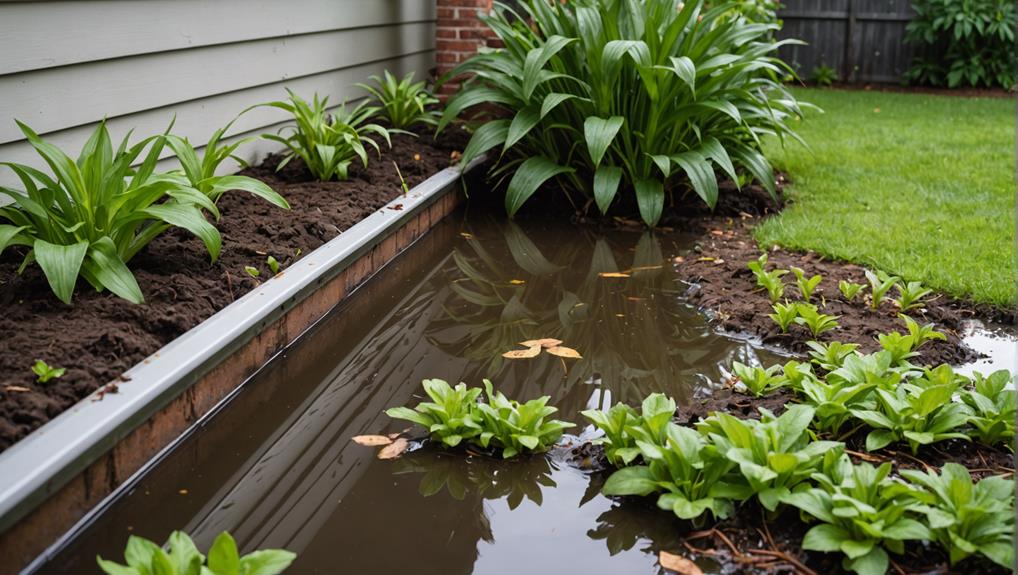Water damage often stems from five main causes: leaky roofs, broken pipes, appliance failures, flooding, and poor drainage systems. To prevent leaks and damage, regularly inspect your roof for missing shingles and promptly address any issues. Confirm pipes are checked and insulated to avoid freezing. For appliances, maintain hoses and seals to prevent leaks. Prepare for heavy rain by cleaning gutters and using sandbags. Finally, keep drainage systems clear and consider landscaping to direct runoff away from your home. Understanding these causes and prevention methods can greatly impact your home's safety and integrity—there's more to investigate on this topic.
Leaky Roofs

Experiencing a leaky roof can lead to significant water damage in your home. It's vital to understand that regular roof maintenance is important in preventing leaks. Neglecting this can result in compromised shingles, which may allow water to seep through. Over time, this can cause structural issues, mold growth, and insulation problems.
You might not realize that insulation issues often accompany roof leaks. When water infiltrates your roof, it can saturate your insulation, rendering it ineffective. This not only increases your energy bills but can likewise create a perfect environment for mold to thrive. To keep your home safe, you should inspect your roof at least twice a year, looking for signs of wear, such as missing shingles or cracks.
If you notice any leaks, addressing them promptly is key. Repairing a small leak is far less costly than dealing with the aftermath of significant water damage. By staying proactive with roof maintenance and addressing insulation issues right away, you'll protect your home and guarantee a comfortable living space for you and your family. Remember, a little attention now can save you from major headaches later.
Broken Pipes
Identifying broken pipes is crucial in preventing extensive water damage in your home. These issues can arise from various factors, including temperature fluctuations and aging infrastructure. To protect your space, you can take several proactive steps:
- Inspect pipes regularly for signs of wear or leaks.
- Ensure proper pipe insulation, especially in unheated areas, to prevent freezing in colder months.
- Perform seasonal maintenance by checking water pressure and ensuring all connections are secure.
- Address moisture issues immediately, as even small leaks can escalate quickly.
- Know the location of your main shutoff valve; it can save you time during an emergency.
Appliance Failures

While broken pipes can lead to significant water damage, appliance failures are another common source that homeowners must consider. Water heater issues are often sneaky; they can develop slowly over time, leading to leaks that go unnoticed until significant damage occurs. Regular maintenance, like flushing the tank and checking the pressure relief valve, can help you catch these problems early.
Washing machine leaks are another frequent culprit. The hoses can wear out or become loose, resulting in water pooling on your floor. It's crucial to inspect these hoses regularly and replace them every five years or sooner if you notice any cracks or bulges. Furthermore, confirming that your washing machine is level can prevent undue stress on the hoses.
Don't overlook your dishwasher, either. A malfunctioning door seal or a clogged drain can lead to unexpected leaks. To prevent this, regularly check the door seal for wear and verify that the drain isn't obstructed.
Flooding and Heavy Rain
Flooding and heavy rain can lead to severe water damage, especially in areas prone to such weather conditions. To protect your home, it's vital to engage in storm preparation and have emergency kits ready. Here are some important steps to take into account:
- Inspect your gutters and downspouts regularly to make certain they're clear of debris.
- Raise electrical appliances and systems above potential flood levels.
- Use sandbags to create barriers around your property when heavy rain is forecasted.
- Install sump pumps in basements to help manage excess water.
- Keep an emergency kit stocked with necessities like water, non-perishable food, and first-aid supplies.
Poor Drainage Systems

A well-functioning drainage system is vital for preventing water damage in your home. When drainage systems fail, excess water can accumulate around your property, leading to foundation issues and mold growth. To avoid these problems, regular drainage maintenance is important. Check your gutters and downspouts frequently to verify they're clear of debris, allowing water to flow freely away from your home.
Consider implementing effective landscaping solutions, such as grading your yard to direct water runoff away from the foundation. Installing French drains can additionally help manage water flow effectively, especially in areas prone to heavy rainfall.
Furthermore, be mindful of any nearby trees or shrubs, as their roots can infiltrate drainage systems, causing blockages. If you notice pooling water or soggy patches in your yard, it's a sign that your drainage system needs attention.
Conclusion
To sum up, being proactive about the top causes of water damage can save you from substantial headaches and costs down the line. Think of your home as a ship; even a small leak can eventually sink it if left unchecked. By regularly inspecting your roof, plumbing, and drainage systems, you can prevent a minor drip from turning into a full-blown flood. Stay vigilant, and your home will remain a sturdy vessel instead of a sinking ship.
